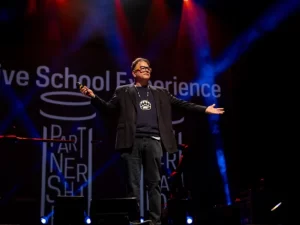Wente hired as storyteller-in-residence by Toronto Metropolitan University

By Sam Laskaris
TORONTO – Jesse Wente, a Serpent River First Nation citizen, has been hired as the Indigenous Storyteller-in-Residence at The Creative School, located at Toronto Metropolitan University (TMU).
The Creative School consists of 10 departments at TMU. Wente will work out of Saagajiwe, the hub for Indigenous creative practice and storytelling at the Toronto university.
“We’re still figuring that out,” Wente said of what his job responsibilities will entail. “But I think what I’m looking forward to doing is interacting with students through mentorship and also thinking about, obviously not teaching a course, but maybe allowing other opportunities for a different style of learning and a different style of sort of storytelling and knowledge exchange.”
While Wente becomes TMU’s first Indigenous Storyteller-in-Residence, he originally applied for another position at the school.
“They were looking for someone to teach in the Indigenous journalism section,” he said. “And they sort of reached out thinking maybe I would apply, which I did.”
Though Wente did not get that position, a school official did get back in touch to see if there was another role he would like to fulfill with TMU.
“This is sort of where we ended up,” he said. “And I think in a lot of ways, it’s a better fit for me. I’m not sure I’m cut out to be a tenure-track sort of professor type person. And it appeals to me as well because, to be honest, in the last 20 years of my career, I think every job I’ve held did not exist before I did it. And I tend to like that as a way to sort of work.”
Wente has worked as a broadcaster, writer, and arts leader. During his career, he’s worked at CBC Radio, Toronto International Film Festival (TIFF), the Indigenous Screen Office, and the Canada Council for the Arts.
Although his focus will be serving Indigenous people at TMU, Wente said his work will also benefit those who are non-Indigenous.
“Certainly, I think I’m there for Indigenous students and Indigenous faculty,” he said. “But I don’t limit myself to that. And I certainly hope that there’ll be the opportunity for any students because of what a lot of what my interests are. I think what I can share with students comes from an Anishinaabe perspective, but I think it’s useful for Indigenous and non-Indigenous people alike.”
Wente was officially hired last month.
“It’s interesting timing because I’m starting sort of at the end of the term,” he said. “So, there’s, not a lot of action at the moment, but we will be planning some stuff for the fall and hopefully engaging with some of the graduate students over the summer.”
Wente has agreed to a two-year term for his position.
“I think what I’m looking forward to doing is interacting with students through mentorship and also thinking about, obviously not teaching a course, but maybe allowing other opportunities for a different style of learning and a different style of sort of storytelling and knowledge exchange,” he said.
Wente said he’ll also organize storytelling events, where he’ll be looking to be a bridge between the academic world and the storytelling industry.


